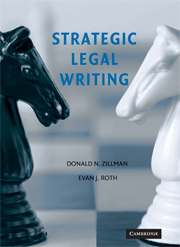Book contents
- Frontmatter
- Contents
- Origins of the Book
- What Is Strategic Legal Writing?
- Using the Text
- Introduction to Chapters One, Three, Five, Seven, and Nine
- Introduction to Chapters Two, Four, Six, Eight, and Ten
- Overview
- 1 Prayer at the Athletic Banquet
- 2 How to Draft a Complaint
- 3 Terminating Professor Melton
- 4 How to Draft a Motion
- 5 Mr. Blaustein's Gift
- 6 How to Respond to a Motion
- 7 Counseling Dean Covelli
- 8 How to Draft a Judicial Opinion
- 9 Advising Professor Melton
- 10 How to Draft a Motion for Summary Judgment
- Follow-Up Sections
- Index
Introduction to Chapters One, Three, Five, Seven, and Nine
Published online by Cambridge University Press: 08 February 2010
- Frontmatter
- Contents
- Origins of the Book
- What Is Strategic Legal Writing?
- Using the Text
- Introduction to Chapters One, Three, Five, Seven, and Nine
- Introduction to Chapters Two, Four, Six, Eight, and Ten
- Overview
- 1 Prayer at the Athletic Banquet
- 2 How to Draft a Complaint
- 3 Terminating Professor Melton
- 4 How to Draft a Motion
- 5 Mr. Blaustein's Gift
- 6 How to Respond to a Motion
- 7 Counseling Dean Covelli
- 8 How to Draft a Judicial Opinion
- 9 Advising Professor Melton
- 10 How to Draft a Motion for Summary Judgment
- Follow-Up Sections
- Index
Summary
All of your work in these chapters (our transactional or office practice chapters) takes place in the hypothetical universe of the University of Katahdin (UK). UK is the largest public university in the mythical American state of Katahdin. You may know the real Katahdin as Maine's magic mountain, beloved by Henry David Thoreau, among others.
UK was founded in 1874 shortly after the admission of the state of Katahdin to the United States. The Constitution of the state mandates the creation of “a public university to serve the citizens of Katahdin.” It also authorizes the Katahdin State Legislature to make “appropriate laws” to govern the university.
UK is the largest educational institution, public or private, in Katahdin. Its 24,000 students and 2,200 faculty and staff work in a major research university that awards associate, bachelor's, master's, professional (including law), and doctoral degrees. While 70 percent of students are Katahdin residents, the remaining 30 percent come from all states of the United States and from 58 foreign nations. Several UK academic programs are ranked in the top ten in the United States. Faculty members in almost all departments are recruited from national and international markets and are expected to be both excellent teachers and significant published scholars in their fields.
The UK is governed by a fifteen-member Board of Trustees. Trustees are appointed by the governor of Katahdin with the approval of the Katahdin State Senate. State law does not specify any qualifications to be a trustee.
- Type
- Chapter
- Information
- Strategic Legal Writing , pp. xxi - xxivPublisher: Cambridge University PressPrint publication year: 2008



